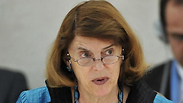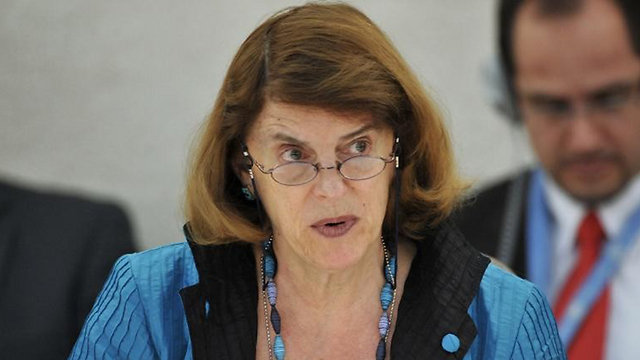
President of the UN Human Rights Council Joachim Ruecker appointed US judge Mary McGowan Davis as the new head of the UN inquiry into Operation Protective Edge, replacing Professor William Schabas who quit on Monday.
Schabas quit the position as the head of the inquiry into the summer war in Gaza after Israel provided information that revealed Schabas had served as a paid consultant for the Palestinian Authority in 2012, receiving 1,300 dollars for his work.
Davis joined the UN committee after Amal Clooney (formerly Alamuddin) decided not to accept the position, and was already a member of three person committee that was headed by Schabas and included former UN racism investigator Doudou Diene of Senegal.
The UN Council on Human Rights announced it would continue forward with the inquiry, despite Schabas' resignation, and publish its findings on March 23 as determined by the committee's mandate.
David has served as a judge for the Supreme Court of the State of New York and had a 25-year-long career as a federal criminal prosecutor in the state of New York. She has extensive experience in international human rights law – Davis is a member of the board of the American Society of International Commission of Jurists (ICJ) and the International Law Academy, and an executive member of the International Association of Justices.
Davis also served a member, and later the chairwoman, on a UN committee of independent experts asked to follow development of the findings of the UN Commission of Inquiry into events of the conflict between Gaza and Israel between December 2008 and January 2009.
After his appointment last year, Schabas said he wouldn't let his past criticism of Israeli leaders affect his ability to carry out the investigation. But in Israel he was widely regarded as having a distinct anti-Israel bend.
Schabas said on Monday he would resign after Israeli allegations of bias due to consultancy work he did for the Palestine Liberation Organisation.
Netanyahu said in a statement that following the resignation, publication of the report ought to be shelved and that the Islamist Hamas group ruling Gaza should be investigated rather than the Jewish state.
More than 2,100 Palestinians, most of them civilians, 67 Israeli soldiers and six civilians in Israel were killed in last summer's conflict. The UN investigation, due to issue its report on March 23, is investigating violations by both sides.
Schabas' resignation followed a letter from Israel's UN envoy in Geneva, Eviatar Manor, to Human Rights Council President Joachim Ruecker of Germany decrying what he called a "blatant conflict of interest" and Schabas' prior relationship with the Palestinians. Manor demanded his immediate dismissal in the Jan. 30 letter, made public on Tuesday.
Israel announced some months ago that it would not cooperate with the inquiry, calling it a "kangaroo court". Alleging bias, it had previously boycotted the 47-member state forum for 20 months, returning in October 2013.
Schabas said in a letter to Ruecker he had been paid $1,300 for a legal opinion to the PLO in Oct. 2012, but that he had acted with full "independence and impartiality" as chairman.
"The President respects the decision of Professor Schabas and appreciates that in this way even the appearance of a conflict of interest is avoided, thus preserving the integrity of the process," Ruecker said in a statement.
Investigators were "now in the final phase of collecting evidence from as many victims and witnesses as possible from both sides", he said.
Hamas spokesman Fawzi Barhoum said Schabas' resignation "shows the huge pressure Israel and the Zionist lobby put on the committee and its chairman."
The Israeli pressure "is meant for impunity and killing the truth," Barhoum said.
Netanyahu has accused the UN commission of unfairly targeting Israel and ignoring abuses elsewhere.
"This is the same council that in 2014 made more decisions against Israel than against Iran, Syria and North Korea combined," Prime Minister Benjamin Netanyahu said, adding that Gaza's Hamas rulers "need to be investigated, not Israel."
The 47-member council, which includes several Arab and Muslim-majority countries, has a record of passing more resolutions condemning Israel's alleged abuses than those of other states. The practice has been criticized as excessive by Israel's allies, including the United States, which nevertheless supports the council's overall work.
The inquiry was set up by the Geneva forum last July at the Palestinians' request. Its other member is veteran investigator Doudou Diene of Senegal.
Israel says it went to great lengths to avoid civilian casualties during the summer war in Gaza and accuses Hamas of both firing rockets at Israeli civilians and using its own people as human shields.
Reuters also contributed to this report
















